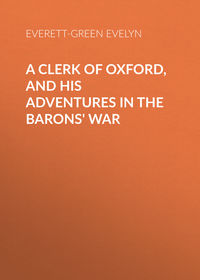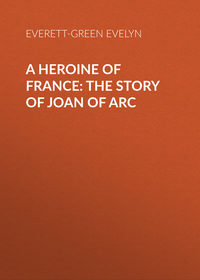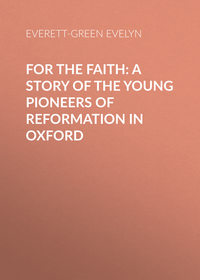 полная версия
полная версияThe Lost Treasure of Trevlyn: A Story of the Days of the Gunpowder Plot
"If I may but win a little gold in these winter days when the forest is too inhospitable to be scoured and searched, I can give the whole of the summer to the quest. I will find these gipsies or their descendants and live amongst them as one of them. I will learn their ways, win their trust, and gradually discover all that they themselves know. Who dare say that I may not yet be the one to bring back the lost luck to the house of Trevlyn? Has it always been the prosperous and rich that have won the greatest prize? A humble youth such as I may do far more in the wild forest than those who have been bred to ease and luxury, and have to keep state and dignity."
Thus musing, Cuthbert rode slowly along in the light of the rising moon, his thoughts less occupied with the things he was leaving behind than with thoughts of the future and what it was to bring forth. The lad had all the pride of his house latent within him, and it delighted him to picture the day when he might return all Sir Richard's benefits a thousandfold by coming to him with the news of the lost treasure, and bidding him take the elder brother's share before ever his own father even knew that it had been found at last. His heart beat high as he pictured that day, and thought how he should watch the light coming into Kate's bright eyes, as the obstacle to her nuptials should be thus removed. Sure she could coax her father to remove his veto and overlook the cousinship if she had dower to satisfy Lord Andover. And if the Trevlyn treasure were but half what men believed, there would be ample to dower all three daughters and fill the family coffers, too.
"In truth it is a thing well worth living for!" cried the eager lad, as he pushed his way out of the wood and upon the highroad, where for a time travelling was somewhat better. "And why should I not succeed even though others have failed? My proud kinsmen have never lived in the forest themselves, learning its every secret winding track, making friends of its wild sons and daughters, learning the strange lore that only the children of the forest gather. What chance had they of learning secrets which but few may know? I trow none. I will not believe that great treasure has been cast away to the four winds. I verily believe it is still hidden away beneath the earth in some strange resting place known but to a few living souls. What do these wild gipsy folks want with gold and silver and jewels? They have all they need with the heavens above them and the earth beneath. They may love to have a buried hoard; they may love to feel that they have treasure at command if they desire it; but I can better believe they would keep it safe hidden in their forest or moorland home than that they would scatter it abroad by dividing it amongst their tribe. Moreover, any such sudden wealth would draw upon them suspicion and contumely. They would be hunted down and persecuted like the Jews in old days. No: they may well have stolen it out of revenge, but I believe they have hidden it away as they took it. It shall be my part to learn where it lies; and may the Holy Saints aid and bless me in the search!"
Cuthbert crossed himself as he invoked the Saints, for at heart he was a Romanist still, albeit he had had the wit to see that the same cardinal doctrines were taught by the Established Church of the land, whose services he had several times attended. And even as he made the gesture he became suddenly aware that he was not alone on the road. A solitary traveller mounted on a strong horse was standing beneath the shadow of a tree hard by, and regarding his approach with some curiosity, though the lad had not been aware of his close proximity until his horse paused and snorted.
"Good even, young man," said this traveller, in a pleasant voice that bespoke gentle birth. "I was waiting to see if I had an enemy to deal with in the shape of one of those rogues of the road, cutpurses or highwaymen, of whom one bears so many a long tale. But these travel in companies, and it behoves wise travellers to do likewise. How comes it that a stripling like you are out alone in this lone place? Is it a hardy courage or stern necessity?"
"I know not that it is one or the other," answered Cuthbert. "But I have not far to go this night, and I have not much to lose, though as that little is my all I shall make a fight ere I part with it. But by what I hear there is little danger of molestation till one reaches Hammerton Heath. And I propose to halt on the edge of that place, and sleep at the hostelry there."
"If you follow my counsel, my young friend," said the stranger as he paced along beside Cuthbert, "you will not adventure yourself in that den of thieves. Not long ago it was a safe place for a traveller, but now it is more perilous to enter those doors than to spend the darkest night upon the road. The new landlord is in league with the worst of the rogues and foot pads who frequent the heath, and no traveller who dares to ask a night's shelter there is allowed to depart without suffering injury either in person or pocket. Whither are you bound, my young friend, if I may ask the question?"
"For London, sir. I have an uncle there whom I am about to seek. But the way is something strange to me when the heath be passed, and I know not if I can find it in the dark."
"I also am bound for London," answered the stranger, "and in these days it is better to travel two than one, and four than two. But being no more than two, we must e'en hope for the best if we fall not in with other belated travellers. My business brooked not delay; wherefore I came alone. I mislike the fetter of a retinue of servants, and I have had wonderful good hap on the roads; but there be others who tell a different tale, and I often join company when I find a traveller to my liking going my way."
Cuthbert was glad enough to have a companion. This man was many years his senior, so that he was somewhat flattered by the proposition of riding in his company; moreover, he was plainly a gentleman of some condition, whose fancy it was (not his necessity) to travel thus unattended. Also he was speedily conscious of a strange sense of fascination which this stranger exercised upon him, for which he could not in the least account; and he quickly found himself answering the questions carelessly addressed to him with a freedom that surprised himself; for why should there be such pleasure in talking of himself and his prospects to one whose name he did not even know?
When first he had pronounced his name, he observed that the stranger gave him a quick, keen glance; and after they had been some time in conversation, he spoke with a sudden gravity and earnestness that was decidedly impressive.
"Young man, I trust that you are loyal and true to the faith of those forefathers of yours who have been one of England's brightest ornaments. In these latter days there has been a falling away. Men have let slip the ancient truths. Love of the world has been stronger within them than love of the truth. They have let themselves be corrupted by heresy; they have lost their first love. I trust it is not so with you. I trust you are one of the faithful who are yet looking for brighter days for England, when she shall be gathered again to the arms of the true Church. But a few minutes ago I saw you make the holy sign, and my heart went out to you as to a brother. These Protestants deny and contemn that symbol, as they despise and contemn in their wantonness the ordinances of God and the authority of His Vicar. I trust you have not fallen into like error; I trust that you are a true son of the old stock of Trevlyn?"
"I know little of such disputed matters," answered Cuthbert, made a little nervous by the ardent glance bent upon him from the bright eyes of the speaker. He had a dark, narrow face, pale and eager, a small, pointed beard trimmed after the fashion of the times, and the wide-brimmed sugar-loaf hat drawn down upon his brows cast a deep shadow over his features. But his voice was peculiarly melodious and persuasive, and there was a nameless attraction about him that Cuthbert was quick to feel. Others in the days to follow felt it to their own undoing, but of that the lad knew nothing. He only wished to retain the good opinion this stranger seemed to have formed of him.
"I have led but a hermit's life, as I have told you. I have been bred up in the faith of my forefathers, and that faith I believe. What perplexes me is that those who hold the Established or Reformed faith, as men term it, have the same creeds, the same doctrines as we ourselves. I have from time to time conformed to the law, and gone to the services, and I have not heard aught spoken within their walls that our good priest in old days used not to tell me was sound doctrine. There be things he taught me that these men say naught about; but no man may in one discourse touch upon every point of doctrine. I freely own that I have been sorely perplexed to know whence comes all this strife, all these heart burnings."
"Thou wilt know and understand full soon, when once thou hast seen the life of the great city and the strife of faction there," answered his companion, lapsing into the familiar "thou" as he spoke with increased earnestness. "In thy hermit's life thou hast had no knowledge of the robbery, the desecration, the pollution which our Holy Mother Church has undergone from these pestilent heretics, who have thought to denude her of her beauty and her glory, whilst striving to retain such things as jump with their crabbed humours, and may be pared down to please their poisoned and vicious minds. Ah! it makes the blood boil in the veins of the true sons of the Church, as thou wilt find, my youthful friend, when thou gettest amongst them. But it will not always last. The day of reckoning will come-nay, is already coming when men shall find that the Blessed and Holy Church may not be defiled and downtrodden with impunity for ever. Ah yes! the day will come-it is even at the door-when God shall arise and his enemies be scattered. Scattered-scattered! verily that is the word. And the sons of the true faith throughout the length and breadth of the land shall arise and rejoice, and the heretics shall stand amazed and confounded!"
As he spoke these words his figure seemed to expand, and he raised his right hand to heaven with a peculiar gesture of mingled menace and appeal. Cuthbert was silent and amazed. He did not understand in the least the tenor of these wild words, but he was awed and impressed, and felt at once that the strife and stress of the great world into which he was faring was something very different from anything he had conceived of before.
By this time the travellers had reached the dreary waste called by the inhabitants Hammerton Heath. At some seasons of the year it was golden with gorse or purple with ling, but in this drear winter season it was bare and colourless, and utterly desolate. The outline of dark forests could be seen all around on the horizon; but the road led over the exposed ground, where not a tree broke the monotony of the way. Cuthbert was glad enough to have a companion to ride by his side over the lonely waste, which looked its loneliest in the cold radiance of the moon. He did not reply to the strange words he had just heard, and his companion, after a brief pause, resumed his discourse in a different tone, telling the lad more about London and the life there than ever he had heard in his life before. But the moral of his discourse was always the sufferings, the wrongs, the troubles of the Roman Catholics, who had looked for better times under Mary Stuart's son; and gradually raising within the breast of the youth a feeling of warm sympathy with those of his own faith, and a distrust and abhorrence of the laws that made life well nigh impossible for the true sons of the Church.
"Ruined in estate, too often injured in body, hated, despised, hunted to death like beasts of the earth, what is left for us but some great struggle after our lives and liberties?" concluded the speaker, in his half melancholy, half ardent way. "Verily, when things be so bad that they cannot well be worse, then truly men begin to think that the hour of action is at hand. Be the night never so long, the dawn comes at last. And so will our day dawn for us-though it may dawn in clouds of smoke and vapour, and with a terrible sound of destruction."
But these last words were hardly heard by Cuthbert, whose attention had been attracted by the regular beat of horse hoofs upon the road behind. Although the track was but a sandy path full of ruts and holes, the sound travelled clearly through the still night air. Whoever these new travellers were, they were coming along at a brisk pace, and Cuthbert drew rein to look behind him.
"There be horsemen coming this way!" he said.
"Ay, verily there be; and moreover I mislike their looks. Honest folks do not gallop over these bad roads in yon headlong fashion. I doubt not they be robbers, eager to overtake and despoil us. We must make shift to press on at the top of our speed. This is an ill place to be overtaken. We have no chance against such numbers. Luckily our steeds are not way worn; they have but jogged comfortably along these many miles. Push your beast to a gallop, my lad; there is no time to lose."
Cuthbert essayed to do this; but honest old Dobbin had no notion of a pace faster than a leisurely amble. Most of his work had been done in the plough, and he had no liking for the rapid gallop demanded by his rider.
The lad soon saw how it stood with him, and called out to his well-mounted companion not to tarry for him, but to leave him to chance and kind fortune.
"I have so little to lose that they may not think me worth the robbing, belike. But you, sir, must not linger. Your good steed is equal to theirs, I doubt not, and will carry you safe across the heath."
"Ay, verily he will. I purchased him for that same speed, and it has never failed me yet. I fear not pursuit. My only peril lies in the chance of meeting a second band watching the road farther on. I like not thus to leave you, boy; but I have no choice. I may not risk being robbed of my papers. There be more in them than must be suffered to be scanned by any eyes for which they were not meant. My gold might go, and welcome, but I must save my papers. And if thou hast any small valuables about thee, I will charge myself with the care of them, and thou canst call at my lodging in London when thou gettest there to claim thine own again. 'Twill be the better chance than leaving yon gentlemen to rid thee of them."
The smile with which the stranger uttered these words was so winning and frank, that Cuthbert placed his purse in the outstretched hand without a qualm.
"When thou wantest thine own again, go to the Cat and Fiddle in the thoroughfare of Holborn, and ask news there of Master Robert Catesby. It is an eating house and tavern where I am constantly to be met with. If I be not lodging there at that very time, thou wilt have news of me there. Farewell; and keep up a brave heart. These fellows are less harsh with poor travellers than rich. Let them see you have small fear, and it will be the better for all."
These last words were faintly borne back to Cuthbert on the wings of the wind, as his companion galloped with long easy strides across the heath. A little dip in the ground hid for a moment their pursuers from sight, and before they emerged upon the crest of the undulation, Master Robert Catesby was practically out of sight; for a cloud had obscured the brightness of the moon, and only a short distance off objects became invisible.
Cuthbert rode slowly on his way, trying to compose himself to the state of coolness and courage that he would like to show in the hour of danger. He felt the beatings of his heart, but they were due as much to excitement as to fear. In truth he was more excited than afraid; for he had absolutely nothing to lose save a suit of old clothes and his horse, and both of these were in sorry enough plight to be little tempting to those hardy ruffians, who were accustomed to have travellers to rob of a far superior stamp.
Nearer and nearer came the galloping horse hoofs, and a loud, rough voice ordered him to stop.
Cuthbert obeyed, and wheeled round on his placid steed, who showed no sign of disquietude or excitement, but at once commenced to nibble the short grass that grew beside the sandy track.
"And what do you want of me, gentlemen?" asked Cuthbert, as he found himself confronted by half-a-dozen stalwart fellows, with swarthy faces and vigorous frames. They were all armed and well mounted, and would have been formidable enough to a wealthy traveller with his stuff or valuables about him.
"Your money-or your life!" was the concise reply and Cuthbert was able to smile as he replied:
"Marry then, it must be my life, for money I have none. I have naught but an old suit of clothes and a breviary in yon bag. You are welcome to both an ye will condescend to wear such habiliments; but I trow ye would find them sorry garments after those ye now display."
"Tut, tut! we will see to that. There be many cunning fashions of hiding money, and we are used to such tales as yours. Where is your companion, young man?"
"Nay, I have no companion," answered Cuthbert, who was sufficiently imbued with the spirit of his father's creed not to hesitate for a moment to utter an untruth in a good cause, and think no shame of it; "I am journeying forth to London alone, to seek a relative there, who methinks will help me to earn an honest livelihood. I would I were the rich man you take me for. But even the dress I wear is mine through the charity of a kinsman, as is also the nag I ride. And I misdoubt me if you would find him of much use to you in your occupation."
One or two of the men laughed. They looked at Dobbin and then at his rider, and seemed to give credence to this tale. Cuthbert's boyish face and fearless manner seemed to work in his favour, and one of the band remarked that he was a bold young blade, and if in search of a fortune, might do worse than cast in his lot with them.
"Yet I verily thought there had been two," grumbled another of the band; "I wonder if he speaks sooth."
"I warrant me he does, else where should the other be? It was a trick of the moonlight; it often deceives us so.
"Come now, my young cockerel; you can crow lustily, it seems, and keep a bold face where others shrink and tremble and flee. How say you? will you follow us to our lodging place for the night? And if we find no money concealed about you, and if your story of your poverty be true, you can think well whether you will choose to cast in your lot with us. Many a poor man has done so and become rich, and the life is a better one than many."
All this was spoken in a careless, mocking way, and Cuthbert did not know if the proposal were made in good faith or no. But it was plain that no harm was meant to his life or person, and as he was in no fear from any search of his clothes and bag, he was ready and willing to accept the invitation offered, and by no means sorry to think he should be relieved from spending the night in the saddle.
"I will gladly go with you," he answered. "I have spoken naught but sooth, and I have no fear. My person and my goods are in your hands. Do as you will with them; I have too little to lose to make a moan were you to rob me of all."
"We rob not the poor; we only rob the rich-those arrogant, purse-proud rogues who batten and fatten on what they wring from the poor," answered, in quick, scornful accents, the man who appeared to be the leader of this little band. "On them we have scant pity. They have but stolen, in cunning though lawful fashion, what we wrest from them, lawlessly it may be, yet with as good a right in the sight of the free heavens as any they practise. But we filch not gold nor goods from the poor, the thrifty, the sons of toil; nay, there be times when we restore to these what has been drained from them by injustice and tyranny. We be not the common freebooters of the road, who set on all alike, and take human life for pure love of killing. We have our own laws, our own ways, our own code of right and wrong; and we recruit our ranks from bold lads like you, upon whom fortune has not smiled, and who come to us to see if we can help them to better things."
Cuthbert was greatly interested in this adventure. He looked into the dark, handsome face of the man who rode beside him, and wondered if some gipsy blood might not run in his veins. The gipsy people of whom Kate had spoken were well known in all this region, and despite the roving life they led, appeared to be rooted to a certain extent to this wild and wooded tract. He had seen dark faces like this before in the woods; he had often heard stories of the doings of the gipsies around. Before, he had not thought much of this; but now, his interest was keenly excited, and he was delighted to have this opportunity of studying them at close quarters.
"Where are we going, Tyrrel?" asked one of the followers. "It is a bitter cold night, now the wind has shifted, and we are far enough away from Dead Man's Hole."
"I am not bound for Dead Man's Hole. We will to the ruined mill, and ask Miriam to give us shelter for the night. We have ridden far, and our steeds are weary. I trow she will give us a welcome."
This proposition seemed to give general satisfaction. The men plodded on after their leader, who kept Cuthbert close beside him, and they all moved across the heath in an irregular fashion, following some path known only to themselves, until they reached the wooded track to the left, and plunged into the brushwood again, picking their way carefully as they went, and all the while descending lower and lower into the hollow, till the rush of water became more and more distinctly audible, and Cuthbert knew by the sound that they must be approaching a waterfall of some kind.
One of the men had ridden forward to give notice of their approach, and soon in the flickering moonlight the gray walls of an ancient mill, now greatly fallen to decay, became visible to the travellers' eyes. From the open door streamed out a flood of ruddy light, cheering indeed to cold and weary men; whilst framed in this ruddy glow was a tall and picturesque figure-the figure of an old woman, a scarlet kerchief tied over her white hair, whilst her dress displayed that picturesque medley of colours that has always been the prevailing characteristic of the gipsy race.
"You are welcome, son Tyrrel," quoth the mistress of this lone dwelling, as the little cavalcade drew up at the door. "It is long since you favoured old Miriam with a visit. Yet you come at no ill time, since Red Ronald brought us in a fat buck but yesternight, and I have made oaten cakes today, and pies of the best. But who is that with you! I like not new faces in my dwelling place. It were well you should remember this ere you bring a stranger with you."
The old woman's face suddenly darkened as she spoke these last words, and her wonderful eyes, so large and dark as to resemble rather those of a deer than a human being, flashed fiercely, whilst she seemed about to close the door in Tyrrel's face. But he pushed in with a light laugh, leading Cuthbert with him, and saying as he did so:
"Nay, nay, mother, be not so fierce. He is an honest lad enough, I trow; if not, 'twill be the worse for him anon. We have brought him hither to search him if he carries gold concealed. If not, and he proves to have spoken sooth, he may go his way or join with us, whichever likes him best. We could do with a few more bold lads, since death has been something busy of late; and he seems to have the grit in him one looks for in those who join with us. Moreover, he has the dark eyes, and would soon have the swarth skin, that distinguish our merry men all.
"How now, mother! Thou hast eyes for none but the lad! Why lookst thou at him so?"
Cuthbert, too, gazed wonderingly at the handsome old gipsy, who continued to keep her eyes fixed upon him, as if by a species of fascination. He could no more withdraw his gaze than can the bird whom the snake is luring to destruction.
"Boy, what is thy name?" she asked, in a quick, harsh whisper.
"Cuthbert Trevlyn," he answered, without hesitation, and at the name a wild laugh rang out through the vaulted room, illumined by the glow of a huge fire of logs, whilst all present started and looked at one another.
"I knew it-I knew it!" cried the old woman, with a wild gesture of her withered arms, which were bare to the elbow, as though she had been engaged in culinary tasks. "I knew it-I knew it! I knew it the moment the light fell upon his face. Trevlyn-Trevlyn! one of that accursed brood! Heaven be praised, the hour of vengeance has come! We will do unto one of them even as they did unto us;" and she waved her arms again in the air, and glanced towards the glowing fire on the hearth with a look in her wild eyes that for a moment caused Cuthbert's heart to stand still. For he remembered the story of the witch burned by his grand sire's mandate, and he felt he was not mistaken in the interpretation he had put upon the old woman's words.









